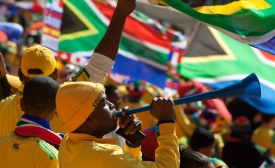soft power
Are there any limits to the channels and tools that a state can use to perpetuate narratives on national identity? Traditional approaches to what has been defined as nation-building have tended to rely on such things as studies of the use of the national language, school education, and political narratives. [...] Indeed, cinema, large-scale events with hundreds of thousands of attendees, cultural initiatives, and even food narratives can be used to construct identity in a path that goes from traditional nation-building to what has recently been defined as nation-branding.
President Trump set off a firestorm Tuesday when he conducted diplomacy-by-tweet. The President took credit for the decision by Saudi Arabia and several other Arab countries to cut off ties with Qatar, an ally that is home to a large base with as many as 10,000 U.S. military personnel. The tweets were a huge surprise given that a day earlier, top U.S. officials had sought to downplay the dispute. “During my recent trip to the Middle East I stated that there can no longer be funding of Radical Ideology. Leaders pointed to Qatar - look!” Trump tweeted Tuesday.
Former Ethiopian health minister Dr Tedros Adhanom Ghebreyesus has been chosen as the director-general of the World Health Organization (WHO). He was nominated by the government of Ethiopia and elected by the WHO member states to begin his five-year term as director-general on 1 July 2017. He succeeds Hong Kong’s Dr Margaret Chan, who has held the position since 2007. [...] His successes with these two organisations included securing increased funding to fight life-threatening diseases in Africa.

A new article explores how South Africa’s soft power is undermined by domestic issues such as racial tension and poverty.
Besides putting his mark in the heart of Europe, Modi is understood to have also brought back momentum to India-Russia relationship amid growing concerns over Moscow's newfound closeness to China and Pakistan. In his typical style, he was able to connect with Germany's Merkel, Russia's Putin and France's Macron as well. Ahead of the restrictive meetings, he told Merkel that India and Germany are made for each other.
Public diplomacy is perception. Remarkably—and, unthinkably, as recently as one year ago—today China seems to be the world’s most likeable superpower. [...] Li, who landed in Berlin on Wednesday, hoped to use his three-day trip, with stops in Germany and Belgium, to “voice support for an open economy, free trade and investment [and] global regional peace and stability." Trump, on the other hand, failed to support NATO, decried Germany as “very bad” for its trade policies, and even pushed aside Montenegro’s prime minister to the front of a group photo.
The UN General Assembly elected Kuwait, Ivory Coast, Equatorial Guinea, Peru and Poland to the UN Security Council on Friday for a two-year term beginning next year, ASharq Al-Awsat newspaper reported Saturday.Kuwait, which will replace Egypt in the seat representing the Arab world, received 188 votes out of the 193-member General Assembly. During the membership campaign that it launched in 2016, Kuwait pledged to adopt balanced policies in dealing with the issues on the agenda of the Security Council.
President Donald Trump's decision to remove the U.S. from the Paris climate agreement is yet another manifestation of how he continues to see U.S. interests as narrowly economic. Had the president a more expansive view of both the nation's interests and influence, he would have kept the U.S. in the accord. Instead, he not only harmed global efforts to address a pressing problem, but also deprived the U.S. of an important source of so-called soft power. In a world in which military might is increasingly difficult and costly to use, America will suffer from this loss.







